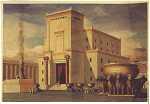Those who were upset by the creation of the State of Israel on May 15, 1948, annually commemorate "The Naqba" (The Catastrophe) on May 15th.
Let's examine how an Israeli newspaper, "Yediot Achronot" attempts to cover the same event on their Hebrew and English websites.
Hebrew Version:The way YNET translated the article into English is as follows:סטודנטים ערבים ציינו את יום הנכבה באוניברסיטה העברית
פורסם: 15.05.07, 14:05
עשרות סטודנטים ערבים הגיעו למתחם האוניברסיטה העברית בהר הצופים בירושלים במטרה לקיים טקס לציון יום ה"נכבה". הסטודנטים הגיעו למקום כשהם לבושים בחולצות שחורות וכאפיות כשהם צועקים "ברוח ובדם נפדה אותך פלסטין".
מולם התייצבו סטודנטים יהודים, חלקם חברי תנועת "אם תרצו", והפריעו להם לערוך דקת דומייה על ידי שירת שירי ארץ ישראל וירושלים. במקום נמצאים שוטרים המאבטחים את שני הצדדים
I will translate this word for word, so you can accurately compare it to YNET's "translation"
Arab Students commemorate Naqba Day at the Hebrew University
Tens of Arab students arrived at the Hebrew University Mount Scopus campus with the intent of hold a commemoration ceremony of the "Naqba". The students arrived wearing black shirts and kafiyas and screaming, "With Spirit and Blood we will redeem you Palestine"
Opposite them, Jewish students arrived, some from the organization "If you will it", and disrupted the when they tried to hold a moment of silence, by singing songs about the Land of Israel and Jerusalem. Police are at hand to secure both sides.
Jerusalem: Jewish students disturb Nakba cemmemoration
Published: 05.15.07, 14:19 / Israel News Jewish students sang the Israeli national anthem and other nationalistic hymn at the Hebrew University of Jerusalem in a deliberate attempt to disrupt a ceremony organized by Arab students to commemorate Nakba day, the day on which the State of Israel was established.
Arab students arrived at a location on the Mount Scopus campus wearing black T-shirts and shouting, "With our blood with our soul we die for you Palestine." (Lilach Shoval)
Questions for the objective reader:
Why is the headline in Hebrew start with the news event about (Israeli) Arab students at the Hebrew University commemorating the birth of the State, while the English edition gets straight to the point: "Jewish students disturb the Naqba Commemoration" Now that certainly puts things into perspective right way! The Jews dared to sing "nationlistic" songs, disturbing a peaceful Arab event.The English version ends off with (presumably, as a result of the provocation of the Jews), Arab students arrived at a location on the Mount Scopus campus wearing black T-shirts and shouting, "With our blood with our soul we die for you Palestine." While in the Hebrew version, the Arabs started off their demonstration with the screaming...
Why the English edition is so Anti-Israeli, while the Hebrew edition gives a much more Pro-Israel version of the event?
In addition to the "moment of silence" in the Palestinian-occupied cities today, other noteworthy Naqba commemorations included:
9 Palestinians killed in Fatah-Hamas clashes in Gaza
Palestinian-Launched Qassam Rocket falls in Sderot
Israeli lightly injured in Palestinian stone throwing attack
IDF forced to open fire as two Palestinians terrorists approached Gaza fence
We wish a Happy Naqba to all the readers and visitors of the Muqata blog, and remind you that tomorrow is Jerusalem Reunification Day, Yom Yerushalayim, as Israel celebrates the 40th year of liberation and reunification of Jerusalem, Judea, Samaria and the Golan Heights.

Wherever I am, my blog turns towards Eretz Yisrael
hey! Where'd the waffle post go?
ReplyDeletei want waffles
ReplyDeleteumm, what about pointing out that the english version makes the 'we die for you palestine' seem a passive result of israeli aggression, whereas in the hebrew translation, it's clear that they are taking action to 'redeem' palestine -- to get technical, it's not clear that the blood with which they are 'redeem'ing it is even their own.
ReplyDeleteWierd; haven't YNET heard of blogs and fact checking and fisking? Surely they don't expect to not get caught at it?
ReplyDeleteBy the way, I voted for you in the categories I felt qualified to vote in!
I saw a similar thing a few weeks ago, also in YNET. Beilin visited Chevron, to check out the disputed house, etc etc. At the end of the article, Noam Arnon, spokesperson of Chevron blamed Beilin for Oslo and suicide bombers. In the hebrew it says ביילין איבד מעט את קור רוחו והשיב בקצרה ובתקיפות, "Beilin lost his cool, and answered shortly and aggresively." In the English version it says "Beilin firmly replied". It's almost the same article, but in the end the English one gives you a feeling that Beilin wasnt bothered by Noam, while in the original Hebrew one he clearly was.
ReplyDeletelinks
http://www.ynetnews.com/articles/0,7340,L-3389089,00.html
http://www.ynet.co.il/articles/1,7340,L-3388908,00.html
We should find out who is translating and what their beef is!
i've noticed a lot of times that the english articles are shorter or are abridgements of the hebrew articles, but i never paid attention to the way informtion is shifted or mistranslated.
ReplyDeleteso what's the motive?
error? editorial bias of the individual translator? a concious attempt by ynet as a whole to appeal to 2 different reading populations?
I'm so glad I have that warm and fuzzy Naqba Day feeling.
ReplyDeleteHi, this is your friendly local freelance translator just to say that the word "צועקים" is translated as shouting, not screaming.
ReplyDeleteAs my comment below/ above claims, I worked in Bonkers' Bagels in the Old City , way back about 7-8 years ago.
ReplyDeleteGuess which day was the busiest?
Yom Yerushalayim!
ReplyDeleteWe were open all night and day, gross over $10,000 shekel. I went home like 5am while someone else took over the store.